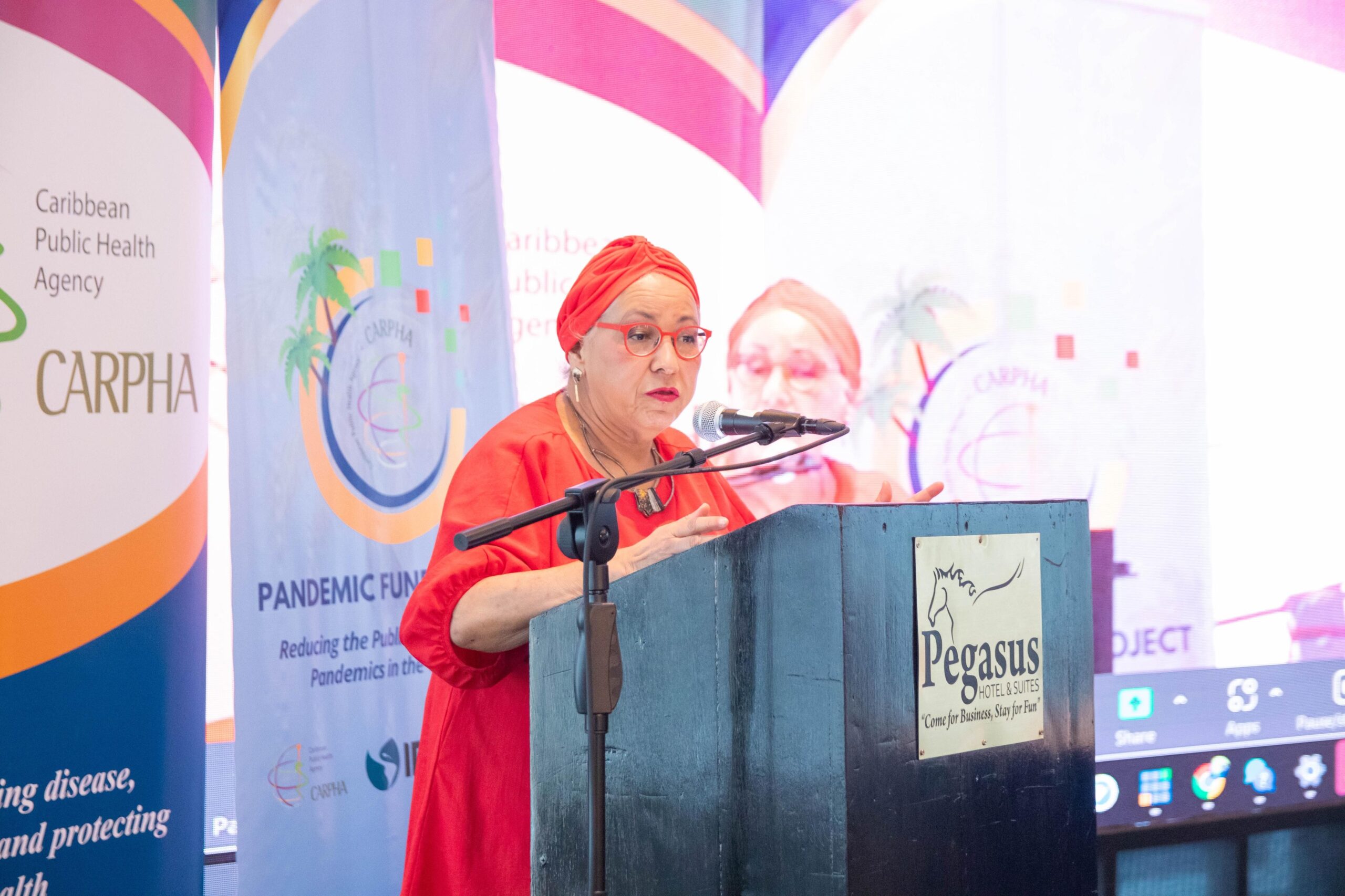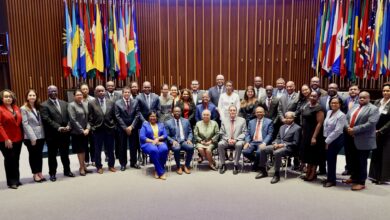The Caribbean’s unique vulnerabilities — from small population bases and porous borders to economic dependence on tourism and the escalating impacts of climate change — demand coordinated, context-specific, and forward-looking solutions. Strengthening our collective capacity to prevent, detect, and respond to health threats is, therefore, not optional, it is imperative.
Alison Drayton | Assistant Secretary-General | Human and Social Development | CARICOM
Regional and international public health stakeholders gathered in Georgetown, Guyana, for the Joint Workshop on Regional Health Security and the Regional Coordinating Mechanism for Health Security, held at the Pegasus Hotel Guyana, on Monday, 28 July. The event marked a pivotal moment in advancing the Regional Health Security Pathway, with discussions focused on assessing progress, identifying remaining gaps, and accelerating efforts to embed the public health tools developed by the Caribbean Public Health Agency (CARPHA) within national development frameworks.
Hosted by CARPHA, the workshop was convened under the theme “Transitioning from Pathway to Action.” It emphasised the importance of strategic coordination across countries and institutions and is aligned with opportunities presented by The Pandemic Fund, positioning the Caribbean to strengthen health systems through unified planning and implementation.
In her opening remarks, CARICOM’s Assistant Secretary-General for Human and Social Development, Alison Drayton, highlighted the Region’s shared experience with recent public health challenges, calling for a shift from vision to tangible results. “This is not only about public health—it is about safeguarding regional development, building resilience, and ensuring sustainability,” she noted.
The workshop provided a platform for dynamic dialogue among partners, reinforcing the collective commitment to a healthier, more secure Caribbean.
Please read the Assistant Secretary-General’s complete remarks below.
WELCOME REMARKS
Alison Drayton
Assistant Secretary-General, Human and Social Development
CARICOM Secretariat
Joint RHS and RCM-HS Workshop | “Transitioning from Pathway to Action”
Pegasus Hotel, Georgetown, Guyana
July 28, 2025 | 9:00 AM
Salutations:
The Honourable Dr. Frank Anthony – Minister of Health, Co-operative Republic of Guyana
Dr. Lisa Indar – Executive Director, CARPHA
Dr. Priya Basu – Executive Head, Pandemic Fund Secretariat
Dr. Kavita Singh – Sector Lead Specialist, Inter-American Development Bank
Esteemed representatives of PAHO/WHO, CDEMA, IMPACS, RSS, UKHSA, and other valued regional and international health partners
Representatives of CARICOM Member States and Associate Members
Development and Technical Partners
Members of the Media
Colleagues, Friends –
Good morning!
On behalf of the CARICOM Secretariat, it is my pleasure to extend a warm welcome to this Joint Workshop on Regional Health Security and the Regional Coordinating Mechanism for Health Security, held under the timely and action-oriented theme, “Transitioning from Pathway to Action.”
We meet today at a critical juncture. Our Region’s shared experience with recent public health threats has underscored the urgent need to transform intention into implementation, strategy into structure, and vision into verifiable results. It is not merely a matter of public health,it is a matter of regional development, resilience, and sustainability.
The Caribbean’s unique vulnerabilities — from small population bases and porous borders to economic dependence on tourism and the escalating impacts of climate change — demand coordinated, context-specific, and forward-looking solutions. Strengthening our collective capacity to prevent, detect, and respond to health threats is, therefore, not optional, it is imperative.
Following the 2014 Ebola threat, our Heads of Government responded with decisive leadership, establishing the Regional Coordination Mechanism on Ebola, which was later expanded in 2015 into the Regional Coordinating Mechanism for Health Security (RCM-HS). This mechanism, chaired by CARPHA, has become an essential pillar in our regional governance framework for health security.
Within this architecture, the Caribbean has led with innovation, developing homegrown tools and systems such as:
- Mass Gathering Surveillance Module,
- Tourism and Health Information System,
- Caribbean Vessel Surveillance System,
- Caribbean Public Health Laboratory Network,
- Caribbean Field Epidemiology and Laboratory Training Programme,
- and most recently, the implementation of projects under the Pandemic Fund.
These innovations represent more than just technical tools; they reflect a deliberate shift toward resilience, multisectoral coordination, and country ownership. We are moving from reactive response to strategic readiness, a vision we must all commit to making real.
We are deeply grateful to CARPHA, our Member States, and all international development partners for their tireless work and collaboration in advancing this agenda. We particularly recognise the critical support provided by the Pandemic Fund and the Inter-American Development Bank, whose investments are helping to future-proof our health systems and empower our Region to better withstand future crises.
Over the course of this workshop, I encourage frank and focused engagement. Let us assess our progress under the Regional Health Security Pathway, identify what remains to be done, and strengthen integration by embedding CARPHA’s public health tools within national health and development plans, all while aligning closely with the broader opportunities offered through the Pandemic Fund.
The CARICOM Secretariat remains steadfast in its commitment to advancing a Regional Health Security framework that is not only operational and effective, but inclusive and people-centred. Together, we must work to ensure that our health security efforts protect lives, preserve livelihoods, and secure the well-being and future of our Caribbean Community.
I thank you for your presence and participation and wish you a productive, solution-driven workshop.
Thank you






